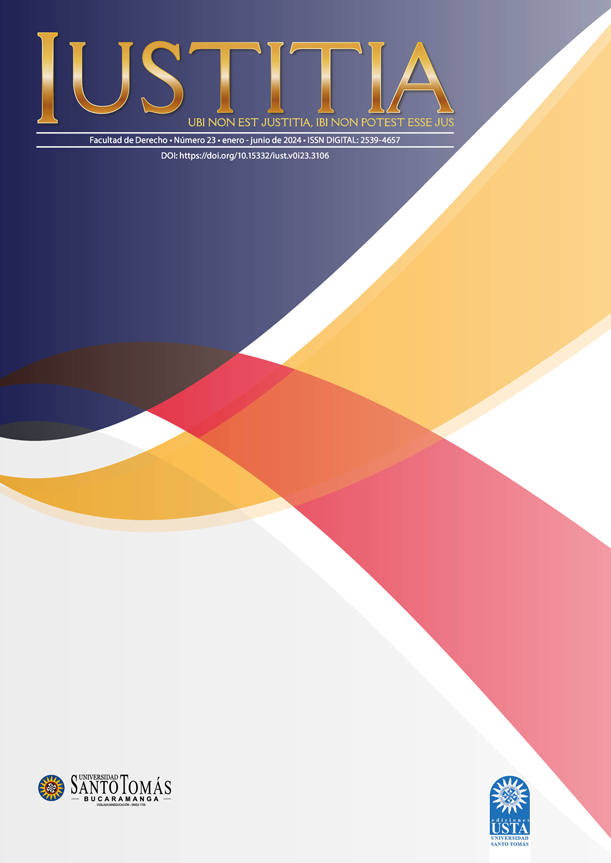Administrative supervision dynamics: regulatory perspectives, collaboration, and challenges
DOI:
https://doi.org/10.15332/iust.v0i23.3104Keywords:
Administrative supervision, State intervention, Economic Administrative Law, Publica-private collaboration, Market failuresAbstract
The article addresses the complex web of interactions in the public sector, highlighting the rationality that drives the maximization of individual benefits. The economic role of the State and the activities it carries out in market economies are analyzed, pointing out virtues and defects. In the Colombian context, the institutionalization of public entities is examined. The importance of the independence of supervisory authorities to avoid political influence and ensure a technical approach is highlighted. It also addresses the lack of clarity in inspection procedures and suggests the need for a general theory to guide these activities in a proportionate and effective manner.
On the other hand, the role of supervised subjects is explored, highlighting collaboration as a legal duty and the importance of reporting duties to reduce imbalances. In the context of legal globalization, supranational and multilateral institutions play a crucial role in administrative oversight, influencing state regulations and practices in areas such as fisheries policy and corporate governance.
Public-private collaboration is evidenced in auditing and certifying entities that, under state regulation, verify compliance with regulations, contributing to efficiency and quality in economic activities, although it poses challenges in the application of Administrative Law and the need to adapt to the speed of economic development.
Downloads
References
Cooter, R., & Ulen, T. (2016). Derecho y economía (Sexta edición). Fondo de Cultura Económica.
Devis Cantillo, J., Gómez Quiñones, M. del P., & López Pontón, E. (2019). Obligación de información y asimetrías de información en el mercado bancario colombiano. Revista de Economía Institucional, 161–186.
Fernández Ramos, S. (2002). La actividad administrativa de inspección. El régimen jurídico general de la función inspectora. Comares.
Gamero Casado, E., & Fernández Ramos, S. (2021). Manual Básico de Derecho Administrativo (18th ed.). Tecnos.
García Ureta, A. (2006). La potestad inspectora de las administraciones públicas. Marcial Pons.
Lasheras, M. Á. (1999). La regulación económica de los servicios públicos. Editorial Ariel.
Nevado-Batalla, P. (2000). La intervención administrativa en la industria: seguridad y control. Comares.
OCDE. (2016). Principios de Gobierno Corporativo. In G20/OCDE Principios de Gobierno Corporativo. OECD Publishing. https://doi.org/10.1787/9789264259171-es
OCDE. (2019). Estudios Económicos de la OECD: Colombia 2019. OECD. https://doi.org/10.1787/805f2a79-es
Olías de Lima, B. (2006). Manual de organización administrativa del Estado. Síntesis.
Ojeda Amaya, C.E. (2023) La captura del supervisor: entre la discrecionalidad y la corrupción. En Desafíos en la lucha contra la corrupción: gestión de riesgos y paradigmas globales. (pp.141-155). Editorial Colex.
Parejo Alfonso, L. (2016). La vigilancia y la supervisión administrativas. Un ensayo de su construcción como relación jurídica. Tirant Lo Blanch.
Rivero Ortega, R. (2000). El Estado vigilante. Tecnos.
Sarmiento Pavas, D. (2007). La misión Kemmerer y el control estatal. Apuntes Contables. (pp.79–90).
Segura, J. (2018). Introducción: los organismos supervisores independientes en economías avanzadas. En Reguladores y supervisores económicos independientes: el caso español (pp. 17–43). Centro de Estudios Ramón Arces.
Stiglitz, J. E., & Roserngard, J. K. (2015). La Economía del Sector Público (4th ed.). Antoni Bosch.
Tirole, J. (2017). La economía del bien común. Taurus.
Usategui, J. M. (2003). Subastas, señales y otras respuestas a las asimetrías de información. Editorial de la Universidad del País Vasco.
Downloads
Published
Versions
- 2025-04-24 (3)
- 2025-04-09 (2)
- 2023-06-30 (1)
How to Cite
Issue
Section
License
Copyright (c) 2024 IUSTITIA

This work is licensed under a Creative Commons Attribution-NonCommercial 4.0 International License.









